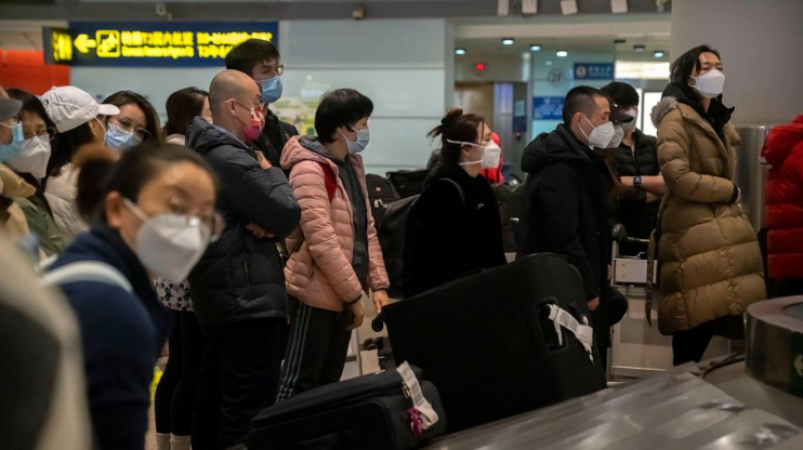
Beijing: China on Tuesday suspended issuing visas for South Koreans to visit the country for tourism or business, in apparent retaliation for South Korea's demand that Chinese tourists undergo COVID-19 tests.
Japanese tourists will also be affected by the ban, according to Japan's Kyodo news service. According to a representative of the Japanese foreign ministry, Tokyo was aware of the report and was talking informally with Chinese officials about how Beijing might respond. Speaking on the customary condition of anonymity, the official said, the ban would be "regrettable".
The Chinese embassy in Seoul issued a brief online notice informing users that the ban would remain in effect until South Korea removed "discriminatory measures on entry by China".
Also Read: Terrorist organization SFJ glorifies Indira Gandhi's killers in Australia, Hindu demanded ban
No additional details were provided, but China has threatened action against nations that demand travelers from China present a COVID-19 test result that was negative within the past 48 hours.
The rule appears to apply only to new applicants and makes no mention of South Korean citizens who already had visas and were living in Beijing and other Chinese cities where Hyundai and Samsung Companies like this conduct important operations.
Chinese Foreign Minister Qin Gang "expressed concern" over the actions by South Korea in a phone call with his South Korean counterpart Park Jin, adding that he "hopes the South Korean side will maintain an objective and scientific approach". "
China's declaration appears to be based on the dire need for reciprocity in international relations. Nearly a dozen countries have followed the US in requiring negative tests for travelers arriving from China, which has since experienced a significant outbreak and lifted its "zero-COVID" restrictions for the first time in three years .
Wang Wenbin, a spokesman for the foreign ministry, defended China's anti-epidemic measures at a daily briefing, saying that "unfortunately, some countries have resorted to discriminatory entry ban measures targeting China, disregarding science and facts and reality". insisted." Home. China strongly rejected it and responded in kind.
Wang only said that he had "made it very clear" in response to inquiries about the suspension of issuing visas to South Korean and Japanese nationals.
China has been accused by the World Health Organization and several other countries of withholding information about the outbreak. The testing requirements are designed to find possible virus variants that travelers may be carrying.
Also Read: Zelensky: Dead bodies litter the battlefield after fierce fighting in Soledar
According to China's ambassador to Australia, those countries' responses to China's COVID-19 outbreak were not appropriate or helpful.
According to Xiao Qian, who spoke to reporters in Canberra, China changed its strategy late last year to contain the infection to prevent severe cases. He argued that nations should adopt a scientific strategy.
The ambassador told reporters that entry restrictions are unnecessary if they are directed toward China.
"If you take a look at some other nations and their policies towards China, I mean, their responsible actions towards China are not beneficial. It is not supported by science. It is blown out of proportion," he declared.
Although China's deeply nationalist government, led by President and Communist Party leader Xi Jinping, has long opposed Seoul's alliance with the United States, online notices from the Chinese embassy in Seoul make no mention of this That's why China chose to specifically target South Korea for retaliation.
An advanced US anti-missile system was deployed in South Korea, and China retaliated by targeting businesses, sports teams and even K-pop groups. This strained relations between South Korea and its largest trading partner, which were previously cordial.
China supported North Korea during the 1950–1953 conflict and stood by Pyongyang despite missile launches and nuclear tests. China has also opposed imposing additional sanctions on the repressive communist government of Kim Jong Un.
Last month, China abruptly changed its strict epidemic prevention guidelines in response to what it claimed was the evolving nature of the outbreak. Three years of lockdowns, quarantines and mass testing followed, resulting in street protests in Beijing and other major cities that had not happened in thirty years.
According to the most upbeat predictions, China's consumer and business activity may pick up in the first quarter of this year.
But before that happens, business owners and families are suffering from a spike in virus cases that has left employers skimping on healthy employees and scared away patrons from eateries, gyms, hair salons and shopping centers.
Also Read: 'Anomaly' in satellite launch from UK reported by Virgin Orbit
The sudden decision by Xi's administration to lift restrictions that forced factories to close and kept millions of people at home will hasten the pace of economic recovery, but it could also cause disruptions this year as businesses scramble to adapt, according to forecasters.
With the start of the upcoming Lunar New Year travel rush, China is already seeing an increase in cases and hospitalisations in major cities and is preparing for a further spread into less developed areas.
Authorities predict that domestic rail and air travel will increase by twofold over the same time last year, bringing total numbers close to those of the 2019 holiday season prior to the pandemic, despite the fact that international flights are still being curtailed